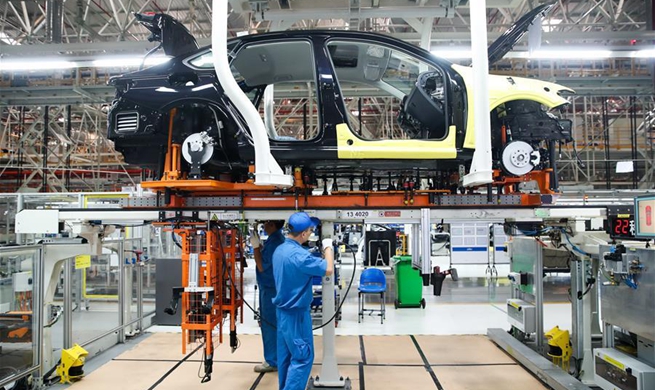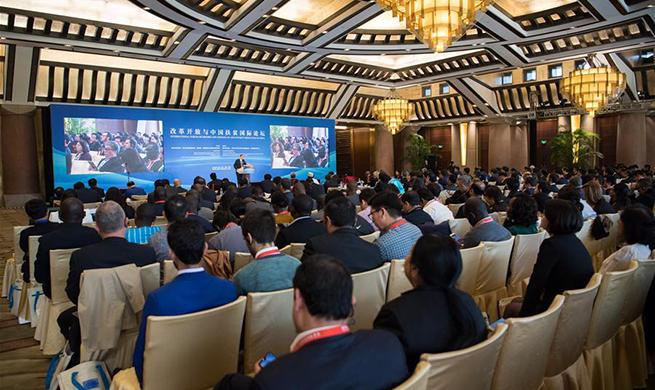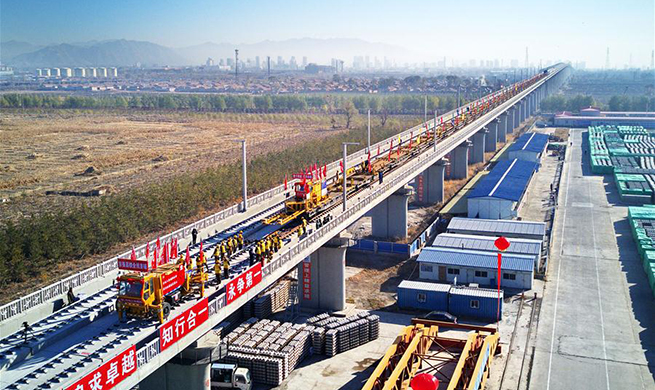by Xinhua writer Chen Wenxian
JERUSALEM, Nov. 1 (Xinhua) -- Practical efforts have boosted fruitful bilateral cooperation between China and Israel, and both sides are expecting their win-win cooperation to be further deepened in the future.
In recent years, the two countries have attached great importance to pushing forward their bilateral relations, and business cooperation in different fields has been carried out against the backdrop of closer ties.
Since China and Israel established full diplomatic relations in 1992, mutual visits and political exchanges at all levels of governments have been conducted frequently.
Particularly, after the "Innovative Comprehensive Partnership" was established when Israeli Prime Minister Benjamin Netanyahu visited China in March 2017, bilateral cooperation has been turning increasingly robust.
In 2014, China and Israel established the mechanism of the China-Israel Joint Committee on Innovation Cooperation (JCIC), with the aim of better enhancing and coordinating innovation cooperation in various fields. The 4th meeting of the JCIC was just concluded in Israel in October this year.
Thanks to all these efforts from both sides, the China-Israel cooperation in many fields, such as the hi-tech sector, has gained notable achievements.
Israel is attracting more investment from China with many Chinese companies building research and development (R&D) centers in Israel. The total amount of investment from China in Israel has exceeded 7 billion U.S. dollars.
The bilateral trade also increases fast. In 1992, the bilateral trade value stood at only 50 million dollars, while in 2017, it soared to over 13 billion dollars.
China is now Israel's largest trading partner in Asia and the third largest across the world. In the first half of 2018, the bilateral trade gained by 21.6 percent, about five times faster than the global average.
"China is a very important partner for Israel and the growing cooperation between the two countries demonstrates this," said Alexander B. Pevzner, founding director of the Chinese Media Center (CMC) in Israel, adding cooperation in areas of trade, academia, tourism, culture and media are all growing.
"Considering the challenges to global trade and governance, the China-Israel ties would become even more important," said Pevzner in an interview with Xinhua.
AVIATION LINKS STRENGTHENED
Israel also has become a favorite destination for Chinese tourists, especially when non-stop air routes linking China with Israel are put into operation, which provide convenient transportation for tourists, travelers and business people from both countries.
In April 2016, China's Hainan Airlines opened the Beijing-Tel Aviv direct flight, then the second one from Shanghai to Tel Aviv in September 2017, and the third from Guangzhou to Tel Aviv in August 2018.
In March 2017, China's Hong Kong airlines Cathay Pacific started the direct flight from Hong Kong to Tel Aviv. And in September this year, China's Sichuan Airlines launched its first direct flight linking western China and Israel.
Up to now, an aviation network is taking shape between China and Israel, with the total number of direct flights reaching 224 per month, giving a great help in pushing the steady increase of visits.
In 2017, a total of 139,000 Chinese people visited Israel, three times as many as in 2015, while the number of Israeli visitors to China reached 52,000.
Better aviation transportation also provides convenience for participants to the upcoming China International Import Expo (CIIE) to be held in Shanghai in early November.
Around 130 countries and regions, including Israel, and about 2,800 companies have confirmed to participate in the event, which is expected to attract more than 150,000 professional buyers.
"The upcoming expo is expected to create more cooperation for the Israeli business sector, which is eagerly looking for an increase of trade with China," said Uriel Lynn, president of the Federation of Israeli Chambers of Commerce (FICC).
He believed the expo can open new doors to the Israeli companies, saying "we are encouraging Israeli companies to participate in this event and the next ones in the coming years."
The Israeli government will have a country pavilion exhibition in the CIIE, which will mainly showcase Israeli innovation and sound bilateral relations. In addition, a group of Israeli companies will also exhibit their products in the CIIE.
"There is a very positive attitude on both sides. We appreciate the commercial relations with China, and we want to intensify them," said Lynn.
TRADE TO INCREASE
In the next five years, China is expected to increase imports from Israel of high-quality commodities and services to meet the demand of its nearly 1.4 billion population.
"The expo is an important and timely initiative by China that comes at a time when the world needs forceful support for global trade," said Pevzner. "This is also an example by China to oppose protectionism, and I hope this will bring benefits for the whole world."
"We are very much interested in having more imports coming from China," said Lynn, who is convinced that removing tariffs, import fees and barriers will benefit the Israeli economy.
Lynn is amazed by China's economic development in the last 20 years. China now is a very major supplier for the whole world and moves in a "very strong" way to increase its manufacturing capacity and ability, which is "very significant" to the world, said Lynn.
"There is now a trend in the world to go the opposite direction regarding free global trade, but we believe in the free global trade. Israeli economy has got much stronger because we open our markets," Lynn noted.
He hopes to further push forward the negotiations over the free trade agreement between China and Israel.
Israel is known for its innovative start-ups and cutting-edge technologies, and Chinese companies are coming to Israel to join hands with Israeli partners. Both sides have made breakthrough on research cooperation and set up joint research platforms.
The year of 2018 marks the 5th anniversary of the Belt and Road Initiative. Israel is among the first Middle East countries to support the initiative and is also a founding member of the Asian Infrastructure Investment Bank.
"The Belt and Road Initiative is a very important policy by China, and a prime example of China acting as a responsible stakeholder. In an era of growing protectionism, the initiative is a much-needed policy and already is a pillar of global governance," said Pevzner.
This year also marks the 40th anniversary of China's reform and opening-up. The Chinese government has reaffirmed that China will open its market wider and contribute more opportunities to the world.
"This is very important and will help boost global trade and economy," said Pevzner.

















